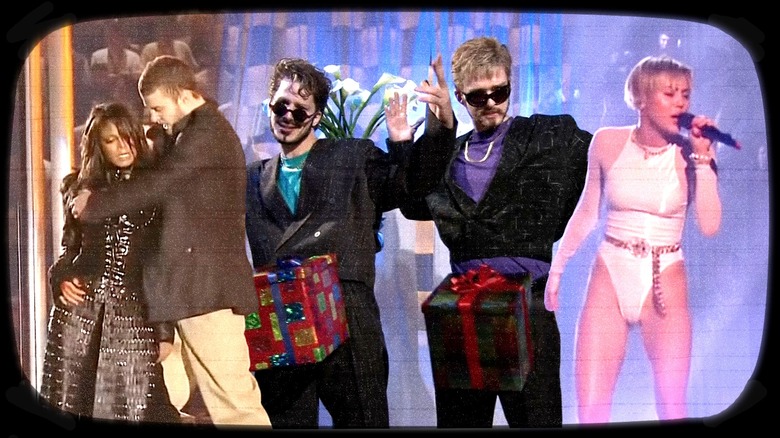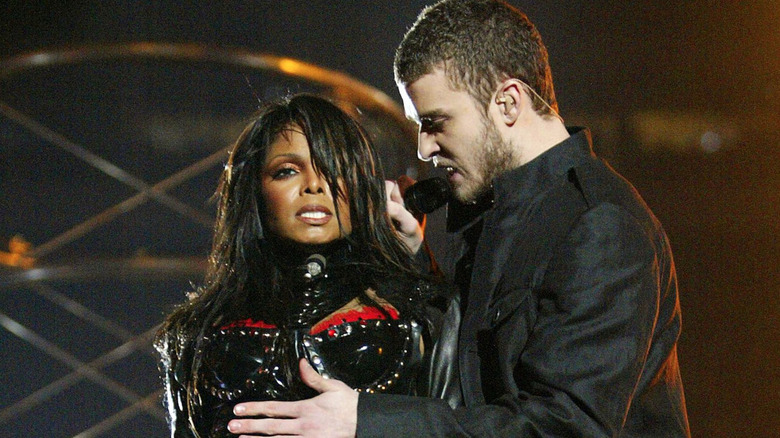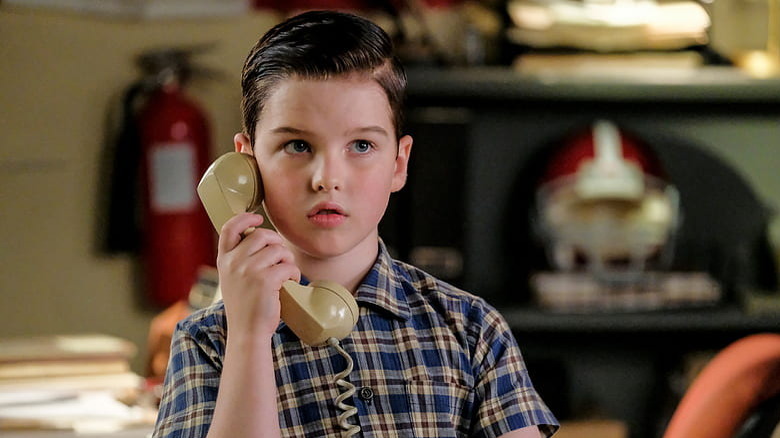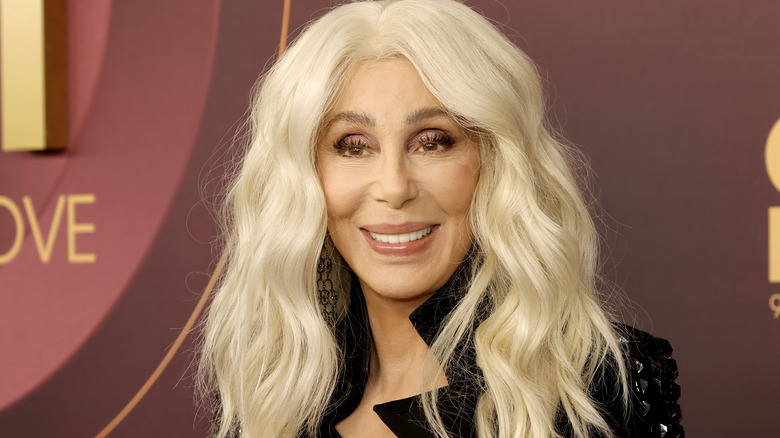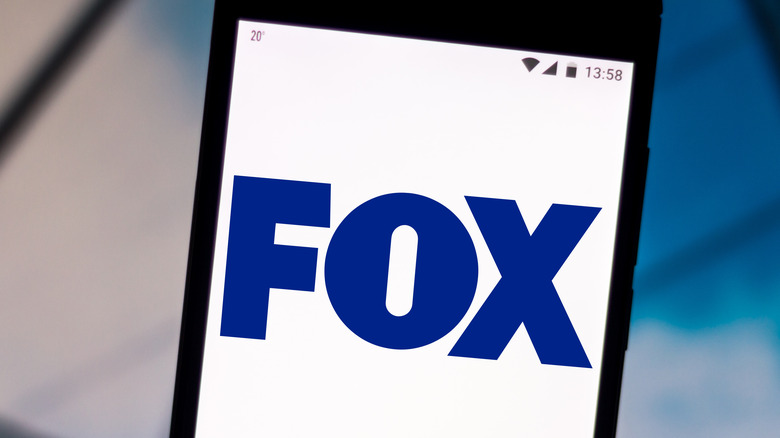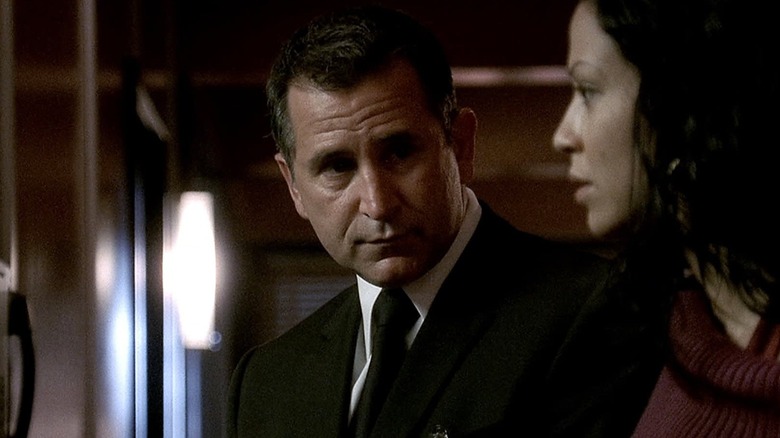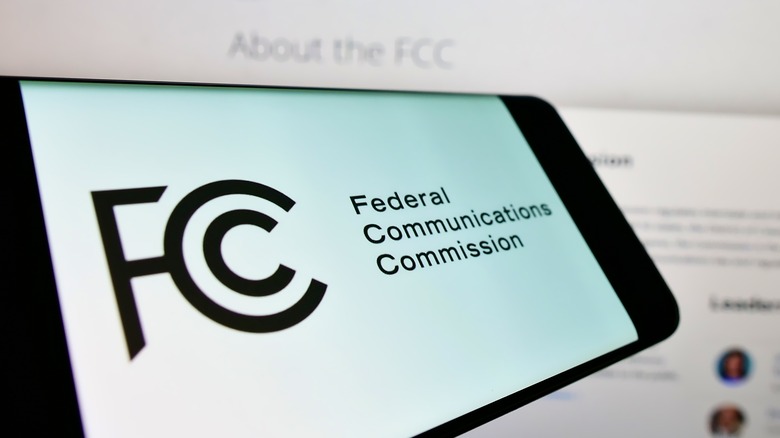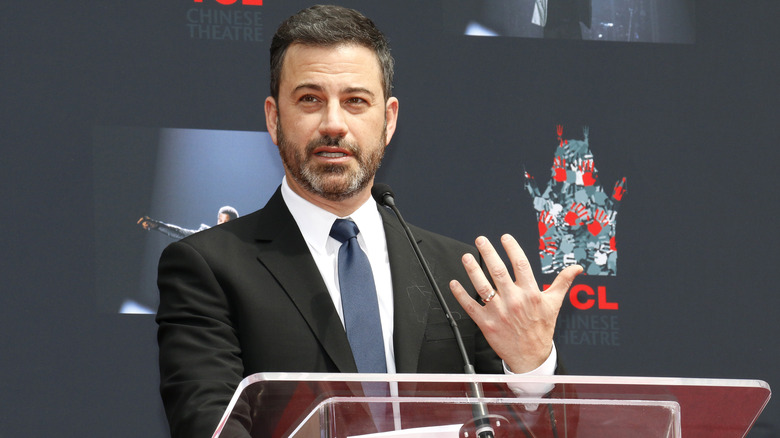TV Moments That Landed Networks In Hot Water With The FCC
The Federal Communications Commission aka the FCC is the U.S. government's regulating body for both national and international transmissions. The FCC is in charge of overseeing everything that is broadcast via radio and television, which covers basic channels like CBS. Premium cable offerings, pay channels like HBO, and streaming services like Netflix are exempt from most FCC regulations, though the FCC does still field complaints for content outside of its purview.
The commission provides many important functions, such as limiting the amount of advertisements networks can show during children's programming, but they are most closely associated with censorship. Many consider the FCC to be stifling to free speech and far too restrictive of content like swearing, blasphemy, and sexuality, while people on the opposite end of the spectrum sometimes consider the organization to be too lenient. The organization has been accused of violating the first amendment, such as with their stringent censorship of comedian George Carlin, who challenged the institution directly. The commission has also been accused of being partisan in favor of the Republican party, especially during the Trump administration when Ajit Pai was appointed as the new chairman of the FCC and set about repealing the Net Neutrality safeguards that protected the internet.
From time to time, television networks land in hot water with the FCC. Sometimes the commission's rule enforcement is warranted, other times the networks fight back. Whatever the outcome may be, it is always costly to tussle with a federal institution in the courts, and most networks would rather stay out of trouble. Here are 12 TV slip-ups that got networks on the FCC's bad side.
The Super Bowl wardrobe malfunction
Long after the FCC's censorship of George Carlin, their next biggest bout in the public spotlight came in 2004. During the Super Bowl XXXVIII halftime show, Justin Timberlake and Janet Jackson became the subject of a massive controversy, when Timberlake ripped part of Jackson's outfit off, exposing her bare breast to the estimated 90 million people watching live. The incident drew numerous complaints from viewers to the FCC and led to Timberlake coining the term wardrobe malfunction to refer to the brief, accidental nudity.
For broadcasting uncensored nudity, the FCC fined CBS $550,000. When CBS refused to pay, the case went into the court system. CBS argued that the FCC had changed its policy in order to institute the fine, and moving the goalposts like that along with the high level of ambiguity in the wording of their guidelines made the fine unconstitutional. When the case reached the Supreme Court after eight years of legal back-and-forth, the court sided with CBS and rejected the FCC's fine.
CBS eventually won its suit in 2012, but it took millions of dollars and several years of time to secure that favorable outcome. Networks with fewer resources can't afford to tangle with the FCC, even when they attempt to impose questionable fines. Before the court case had reached its conclusion, the Super Bowl scandal marked a turning point for the FCC. Moving forward, they grew far stricter and began handing out larger fines with increasing regularity.
Young Sheldon's use of the Emergency Alert System
"Young Sheldon" is probably one of the most squeaky-clean shows on television, but even it is not exempt from FCC oversight and punishment. Back in 2017 during the show's first season, one simple mistake led to the series incurring a $272,000 fine.
The mistake in question was airing the sounds associated with the U.S. Emergency Alert System, which are also known as the EAS tones. These tones are strictly for use by the federal government and are sent out nationwide in the event of an emergency situation via radio and television broadcast. The EAS pairs with the WEA system, or Wireless Emergency Alert system, which sends similar messages to cellphones and covers things like AMBER Alerts and extreme weather warnings. The FCC controls both of these alert systems and prevents them from being used by any party other than FEMA – the Federal Emergency Management Agency — with the only exceptions being made for public service announcements designed to raise awareness about the system.
Using the EAS tones in a work of fiction is strictly prohibited and can also be charged as sending a false distress signal, which is a felony crime. The specific alert included in "Young Sheldon" was a tornado warning. Since there was no actual emergency, the program was not a PSA, and CBS received no prior authorization to use the tones, the FCC was within its means to fine the network for misusing the EAS tones.
Saturday Night Live's frequent controversies
"Saturday Night Live" is the longest-running sketch comedy show in America and also the most viewed comedy program on television as of 2021. The show has been on the air since 1975 and progressed through many different iterations and incarnations. In all its time on the air, "SNL" has gone through more than its fair share of controversies, and many of them have involved the FCC.
Since its inception, the show has been a lightning rod for FCC complaints. "SNL" airs on NBC, and the network has been fined by the FCC multiple times in the past for unrelated matters. The controversial moments on "SNL" have never led directly to fines from the FCC, but they have been eligible for fines and drawn numerous complaints from viewers to the FCC, all of which are public via the Freedom of Information Act. For NBC's part, they have largely ignored the complaints fielded by the FCC.
One of the sketches that kicked up the most outrage was the "D*** in a Box" parody song with Justin Timberlake, who was no stranger to the FCC after the infamous Super Bowl wardrobe malfunction. Other highly controversial moments included the "Djesus Uncrossed" sketch, parodying "Django Unchained," an uncensored F-bomb from Sam Rockwell when he was hosting, and the musical performance from Kanye West and Teyana Taylor in which West dropped uncensored F-bombs and Taylor wore a see-through top.
NYPD Blue got too blue
"NYPD Blue" is a cop show that aired on ABC between 1993 and 2005 for a whopping 12 seasons. The series dodged FCC scrutiny for the vast majority of its run, but one episode in Season 10 caused a major controversy. The episode is titled "Nude Awakening" and, just as that name suggests, it got the show in trouble for containing nudity.
Charlotte Ross, who played Detective McDowell in over 70 episodes of the series, briefly appeared nude in the episode, though it was in a completely non-sexual context and only her backside was fully visible without obstruction. The FCC called the scene a violation of their indecency policy, though many disagreed and thought the commission was making an uproar over nothing, including the network. The fine leveled against the network was $1.4 million, but ABC disagreed with the fine and fought back in court, calling the FCC's decision unconstitutional.
After two years of legal battles between ABC and the FCC, the Second U.S. Circuit Court of Appeals eventually ruled in favor of ABC and dismissed the fine. The court described the wording of the FCC's indecency policy as vague to the point of being unconstitutional. The Court of Appeals also reiterated that they considered the FCC's actions to be harmful to free speech, a stance that the court had already made clear on other rulings where they found the FCC to be in the wrong in the past.
Mr. Robot made some viewers furious
As was demonstrated in the documentary, "This Film is Not Yet Rated," film ratings and restrictions are often not imposed equally on straight vs. LGBT+ subject matter, with the latter facing much tougher scrutiny and censorship. The same holds true for television.
During the first season of the acclaimed USA Network series, "Mr. Robot," the show became the subject of controversy amongst a segment of viewers. One episode featured a sexual interaction between Tyrell Wellick and a male E-Corp employee, and the scene led to numerous complaints to the FCC by outraged audience members. Even though the scene contained no nudity whatsoever and did not explicitly violate any FCC regulations, and despite the outraged viewers taking no issue with the hetero sex scenes in the show, many wrote official complaints to the FCC asking them to take action against "Mr. Robot" and the network. On the network's end, USA was able to safely ignore all of the complaints and continue pushing buttons in future seasons.
The Walking Dead's misuse of EAS tones
"The Walking Dead" was one of the most popular and successful shows on television during its 11-season run on AMC, but that doesn't mean it was free from controversy. Upon hearing that this gory zombie series wound up in hot water with the FCC, one might naturally assume it had something to do with the show's level of violence, but this was not the case.
The FCC had no issue with any violence, language, or sexuality found within the series but instead served the show a fine for its use of a sound effect. "The Walking Dead" is set in the middle of a zombie apocalypse, and the folks making the show used the recognizable sounds of the United States Emergency Alert System as a way to help establish that setting. In response, the FCC fined AMC $104,000.
The use of the real EAS tones or even a simulated version of the EAS tones in a fictional context is strictly prohibited by the FCC and FEMA. The FCC considers this violation to be not just an undermining of the actual EAS system but also a major threat to public safety as it could trigger unwarranted action and panic from anyone who hears the tones and mistakes them as real.
Cher and Nicole Riche swore uncensored
The Fox network found itself coming under fire for violating the FCC's guidelines against indecency on two different installments of the annual Billboard Music Awards live broadcasts. The first instance was an F-bomb dropped by Cher during the 2002 awards, and the second instance was an uncensored "sh**" spoken by Nicole Richie the following year. The charges came a few years later in 2006 and were applied retroactively after their policy regarding 'fleeting expletives' had changed.
Fox disagreed with the decision and brought it to the U.S. Appeals Court, which sided in the network's favor. Rather than letting it go, the FCC elevated the case to the Supreme Court, which reversed the previous ruling and sided with the commission. But the case didn't end there as Fox and the FCC kept battling back and forth in the courts.
In 2012, the United States Court of Appeals for the Second Circuit found the FCC to be in the wrong for changing its policies without adequate reasoning and then applying the new policies retroactively without providing the networks with due notice. The case went back to the Supreme Court, which changed its tune and ruled in the network's favor on the Fox case and the ABC "NYPD Blue" case simultaneously. Supreme Court Justice Anthony M. Kennedy explained their decision, saying, "The commission had changed the rules in the middle of the game ... The commission failed to give Fox or ABC fair notice prior to the broadcasts in question that fleeting expletives and momentary nudity could be found actionably indecent," via The New York Times.
Fox sets the new fine record
In the wake of the infamous Super Bowl snafu, the FCC began cracking down harder on broadcasters while imposing larger fines for infractions. Just one month after the Super Bowl, the commission handed out its biggest fine to date. The recipient was Fox, and the total fine was in the excess of $1.1 million. Causing the infraction was the TV show, "Married by America," which the FCC said egregiously violated their indecency policies.
"Married by America" was a short-lived reality TV show that was canceled after just two episodes. One of these episodes contained footage of strippers at bachelor and bachelorette parties, and the FCC found the content objectionable as it contained pixelated nudity and light sexual acts such as whipped cream licking. The $1.183 million fine was the sum of $7,000 fines leveled against each of the 169 Fox-affiliated TV stations that participated in the broadcast of the offending episode.
After a little investigative journalism, Jeff Jarvis of Buzz Machine discovered that the FCC knowingly or unknowingly lied about the nature of the fine. The commission claimed that their record-setting fine was in response to 159 different complaints they received about the "Married by America" broadcast. Jarvis determined that they had actually only received complaints from a total of three viewers, meaning the FCC had exaggerated the outraged audience members by 53 times the true number. Long after this news came to light, the FCC reduced the fine amount all the way down to $91,000, but Fox outright refused to pay even that much, calling the fine unconstitutional and arbitrary.
Without a Trace's orgy controversy
"Without a Trace" is a procedural crime series about the FBI's NYC Missing Persons Squad. The show aired on CBS for seven seasons and racked up a record-setting fine from the FCC in that time. In the Season 2 episode, "Sons and Daughters," a single scene led to the FCC fining CBS $3.6 million. The controversial scene at the heart of the matter depicted an orgy involving teenage characters, though it is important to note that there is zero actual nudity presented on screen. Despite the lack of nudity, the FCC declared that the scene depicted graphic sex and constituted a severe violation of their indecency guidelines.
CBS disagreed and insisted that the scene was not explicit. In a public statement, the network defended the scene by saying it "featured an important and socially relevant storyline warning parents to exercise greater supervision of their teenage children," per Today. CBS appealed the fine directly with the FCC, but the appeal was rejected. CBS recently faced another massive fine from the FCC to the tune of $3.5 million. This later instance was related to the CBS subsidiary Pluto TV failing to provide closed captioning for deaf and hard-of-hearing viewers even after multiple notices.
The time a news station aired pornography
In 2015, the local news station, WDBJ-TV in Virginia, aired pornography live during a nighttime news broadcast. The station was running a story about a former porn star, and a VT package accompanied the information. The broadcast video was not intended to include any actual pornography, but a little bit slipped by.
There were fewer than three seconds of pornography broadcast, and the illicit content was only visible within a box on the very edge of the screen. The incident was a complete accident that went unnoticed by the station's crew, who said that their preview monitors in the station cropped the edge of the frame and made the pornography invisible to them until it hit the air.
Even though the infraction was extremely brief, obscured, and accidental, the FCC showed no mercy. The commission stuck the WDBJ-TV station with the maximum fine possible for the infraction, which totaled $325,000. The station tried to push back against the fine by arguing that the explicit material was fleeting and in the context of journalism, but the FCC dismissed their reasoning. The chief of the FCC said through a public statement that they planned to make an example out of the station for broadcasting such graphic and offensive material to make it clear that this sort of thing is completely unacceptable.
Miley Cyrus caused over 100 FCC complaints
In the years since her Disney Channel tenure, Miley Cyrus has been a frequent subject of controversy. The outrage usually stems from her provocative and sexually-charged behavior, which some take issue with as indecent. The FCC, unsurprisingly, sides with the offended parties in these matters.
In a career full of controversial televised moments, the individual outing that drew the most scrutiny was likely Cyrus's performance at the MTV Music Video Awards in 2013. She sang and danced alongside Robin Thicke in a performance that involved extensive twerking and other sexual gestures. The routine became the subject of around 150 official FCC complaints. The complaints are all publicly available due to the Freedom of Information Act and they range from surprise at the lack of censorship to rampant misogyny directed at Cyrus.
MTV wasn't bothered, though, and the network even invited Cyrus back shortly after the infamous performance to allow her to respond to the controversy. She said that the outrage wasn't a surprise in the slightest and that she and Thicke knew what kind of reaction they would get before they even stepped foot on stage. The two considered the controversy to be a mark of success since it meant they got people talking and made history.
Conan O'Brien and Jimmy Kimmel's talk show emergencies
In 2018, the ABC network was slapped with a large fine of $395,000 from the FCC. The impetus was an episode of "Jimmy Kimmel Live!" that aired the tones associated with the Emergency Alert System. Instead of using the actual EAS system sounds, the talk show used a simulation of the tones, but that still violates the FCC's rules. Beyond simply constituting a false distress signal, airing real or simulated Emergency Alert tones has the added danger of potentially setting off a chain reaction.
Supposedly, the EAS system contains what are known as operative data elements, which make it so that the sound of the EAS tones going off can trigger nearby devices to set off their EAS alerts as well without receiving a direct signal. That is part of the motivation behind the FCC taking the misuse of the tones so seriously, though it is unclear if these operative data elements have ever actually led to a domino chain of false activations or if the possibility is merely theoretical.
A smaller fine of $25,000 was leveled against TBS in 2013 after a commercial for "Conan" also used the EAS tones. Animal Planet made the same mistake as well during an episode of its show, "Lone Star Law." With all of these examples and the aforementioned "Young Sheldon" and "The Walking Dead" series all making the same mistake, it seems that misuse of the EAS tones is one major FCC rule that many networks were simply unaware of, and the error cost them all big time.
